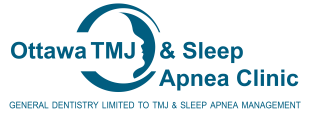Sleep apnea and TMJ treatments in Ottawa, ON

Chronic headaches and migraines can be painful to the point of being completely debilitating. Patients often will seek any form of migraine treatment available. However, the best way to address migraine pain is to address the root cause. In some cases, that root cause may be TMJ. Naturally, relatively few people make the connection while experiencing intense migraine pain that they should be seeing a TMJ expert. Jaw tension can absolutely lead to migraines. Rather than apply the bandaid fix of painkillers, some patients benefit far more from botox. Migraines can be preempted before they even begin, provided that the correct treatment is administered by your TMJ dentist. Explore the connection between migraines, headaches, and botox therapy.
So how can Botox therapy relieve headaches, and what is the mechanism by which it is used to help treat patients with TMJ-associated migraines and pain?
There’s a specific set of reasons that we can treat your migraines in some cases with botox. Migraines which come about as a result of TMJ in particular.
Explore the relationship between headaches and botox therapy.
What Is
Temporomandibular Joint Disorder?
Temporomandibular joint disorder or TMJ is an umbrella term used to describe tension, pain, and dysfunction of the jaw and surrounding area. Pinpointing the exact cause of this disorder isn’t always easy, but our dentists at Ottawa TMJ & Sleep Apnea Clinic will perform a thorough inspection and examination to determine the source of the headaches or migraines that you’re experiencing.
How can Botox Therapy Relieve Headaches and Migraines?
When patients suffer from a form of temporomandibular joint disorder, some of the more common symptoms that come about as a result are aches and pains around the face and jaw area, including headaches and migraines. Although the source of TMJ disorders can be difficult to identify, there can be many contributing factors such as stress, which can lead to nocturnal teeth grinding. This contributes greatly to jaw tension, which can lead to migraines. Botox might be the solution.
It has proven to be an effective alternative TMJ migraine treatment, since it can target the surrounding muscles of the jaw and face. This can help prevent them from grinding and clenching while the patient is asleep, which is a common contributing factor for TMJ associated headaches.
Am I a Candidate for Botox Therapy?
If you suffer from a TMJ migraines, experience aches and pains in the jaw, or intense discomfort in your mouth, cheek, or even sinuses, you should contact us at the Ottawa TMJ & Sleep Apnea Clinic as soon as possible. Our team will assess your jaw and facial area, or perform X-rays if necessary to get a thorough understanding of what is causing your pain. If teeth are grinding and tension is a source of your headaches, Botox could be a recommended migraine treatment for you.
Even though Botox is safe to use, each patient will undergo a screening process to ensure they are an eligible candidate for this treatment. Our team will always ensure that every patient fully understands the process thoroughly so they can feel safe and comfortable in our clinic. Contact us today.
Frequently Asked Questions About Headaches & Botox Therapy
Yes! When patients receive Botox therapy, they experience fewer days of migraines and report fewer missed days at work. It all started when patients who were using Botox to treat wrinkles told their doctors that they were having fewer migraines, so doctors began to study it as a migraine solution.
Doctors believe that Botox works for migraines by blocking the pain receptors from your brain called neurotransmitters from reaching your head and neck and causing a migraine headache.
The predictable course of headaches and Botox therapy has made it a trusted treatment among healthcare professionals and patients alike.
Unlike most oral medications that are used to treat a headache or migraine after they’ve started, Botox can prevent them from occurring in the first place. Botox is the first FDA-approved preventative treatment for chronic migraines. As you can see, research suggests that the connection between headaches and botox therapy can yield optimal results.
With Botox therapy, you’ll schedule appointments every 12 weeks for treatment instead of taking medication in the event of a headache or migraine. Treatments are more effective with the second round of Botox and even more effective thereafter. You can expect to see improvement 10 to 14 days after your treatment.
During your Botox treatment, Dr. Dahan will use a sharp needle for injections to ensure the process is pain-free. When the treatment is performed by an experienced practitioner, such as Dr. Dahan, you can avoid pain and adverse reactions. Botox contains a saline solution that may cause a stinging sensation when injected. However, the discomfort is minimal and should subside shortly after your treatment.
The treatment takes about 10 to 15 minutes and most people return to their normal activities afterward. If you’re interested in learning more about the Botox treatment for migraines, schedule a free consultation with Dr. Dahan. During the consultation, you’ll discuss your symptoms and he’ll provide you with a customized treatment plan. The relationship between headaches and Botox therapy has proved to be beneficial for patients who are seeking relief from their pain.
In 2010, the FDA approved Botox for chronic migraine relief and most insurance companies followed suit by covering a portion or all of the expenses. We recommend contacting your provider prior to your appointment for a better understanding of your coverage.
If there are any specific questions we can answer about the relationship between headaches and Botox therapy, feel free to contact our office by calling (613) 454-1854 and one of our knowledgeable team members will be happy to assist you.
